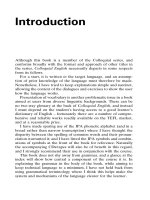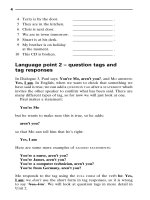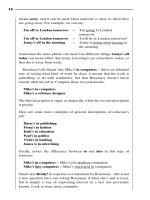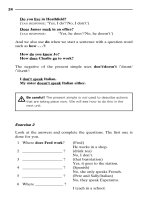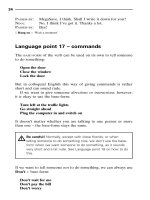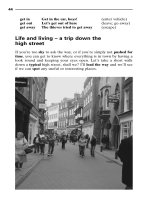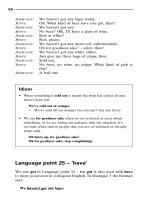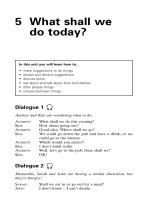Tài liệu A complete English language course part 20 doc
Bạn đang xem bản rút gọn của tài liệu. Xem và tải ngay bản đầy đủ của tài liệu tại đây (132.37 KB, 10 trang )
taxes – money we pay to the state for the government to use
household – group of people sharing a home
licence – a piece of paper you have to buy from the government to be
allowed to do something
adverts – short films designed to encourage you to buy things
commercial breaks – interruptions during and between programmes to
show adverts
finance – fund
distinct – visibly or noticeably different from each other
viewers – people who watch television
similar – looking almost the same as each other, having almost the same
appearance
increasingly – more and more
in competition with – trying to be or do better than
additional – extra, more
via – through
satellite – machine that orbits the earth and relays TV and radio signals
cable – an underground electronic bundle of wires that feeds television
signals into homes
subscribe – pay a regular amount of money to have a continual service
fee – the payment you make to subscribe to a service
dish – piece of equipment to receive satellite signals
pick up – receive (television and radio signals)
range – selection, choice
scheduled – planned to be shown, set down in the TV guide
remote – device for controlling your television at a distance, so you don’t
have to get out of your chair to change channels
station – channel (but we say channel for TV and station for radio)
exercise – physical activity to keep yourself fit
174
11 I’ll see you at
half past five!
In this unit you will learn how to:
• make arrangements with people
• tell the time
• use other time expressions
• buy tickets for public transport
• use prepositions in wh-questions
Dialogue 1
Adrian’s buying a train ticket over the phone.
A
DRIAN
: Could I have a return ticket to Glasgow for
tomorrow?
C
LERK
: Certainly. Where are you travelling from?
A
DRIAN
: From Brighton.
C
LERK
: And when do you want to arrive?
A
DRIAN
: I’ve got a meeting at twelve. Will the seven o’clock
train get me there in time?
C
LERK
: Yes, but unfortunately you’ve left it too late – there
are no seats left on that train. I can book you onto the
nine-thirty, but you’ll be late for your meeting.
A
DRIAN
: I can’t miss the meeting. What about the sleeper train
tonight?
C
LERK
: Hold on – I’ll check to see if there are any seats left.
[checks on her computer]
Yes, you’re in luck. There are a few left. Shall I make
the reservation?
1111
2
3
4
5
6
7
8
9
10
11
1211
13
14
15
16
17
18
19
20
21
22
23
24
25
26
27
28
29
30
31
32
33
34
35
36
37
38
39
40
41
4211
A
DRIAN
: Yes please. What time does it leave this evening?
C
LERK
: Eight o’clock. And you’ll be in Glasgow by seven
o’clock tomorrow morning.
A
DRIAN
: That’ll give me bags of time to get to the meeting,
won’t it? It will arrive on time, won’t it?
C
LERK
: Yes – and make sure you get here by eight this
evening . . . all our trains leave on time as well!
Language point 65 – telling the time
Telling the time is easy in English. We’ve seen the numbers in Unit
4 – here are the other words you will need:
o’clock /ə`klɔk/ it’s
past just coming up to
to just gone
half /hɑf / exactly
a quarter /ə`kwɔtə/
at
at about
by
To tell someone what the time is, we use it’s . . . :
What time is it? – It’s ten o’clock
To say when something happens, we use at:
I’ll meet you both at
ten o’clock
To give the latest time when something should happen, we use by:
I’ll be back home by
ten o’clock (perhaps earlier)
176
Idioms
• in time means ‘before the latest time possible’
• on time means ‘at the scheduled time’ or ‘punctually’
• bags of time means ‘a lot of time’ or ‘plenty of time’
When we are not sure of the exact time, we use about:
It’s about
ten o’clock
Now let’s have a look at the clock:
Notice that:
• we say a
quarter, but half (not ‘a half
’)
• we usually say ten past (etc.), not ‘ten minutes past
’ which sounds
rather formal
•we always say half past, never ‘half to
’
• in colloquial English we often say just ten instead of ten o’clock:
I’ll meet you at ten
• in colloquial English we often say half ten instead of half past ten
I’ll meet you at half ten
half ten and half past ten both mean 10.30!
• we have special words for 12.00 at night (midnight) and 12.00 in
the day (midday or noon).
1111
2
3
4
5
6
7
8
9
10
11
1211
13
14
15
16
17
18
19
20
21
22
23
24
25
26
27
28
29
30
31
32
33
34
35
36
37
38
39
40
41
4211
177
12
o’clock
half past
6
11
7
10
8
9
1
five past
5
twenty-five past
2
ten past
4
twenty past
3
a quarter past
five to
twenty-five to
ten to
twenty to
a quarter to
We use just gone and just coming up to to deal with times between
the five-minute intervals on the clock face:
just gone = a short time after
just coming up to = a short time before
So:
10.16 it’s just gone a quarter past ten
10.19 it’s just coming up to twenty past ten
For very precise times, such as railway timetables and schedules, we
use the 24-hour clock, giving two numbers:
10.56 ten fifty-six
13.12 thirteen twelve
Notice:
12.00 twelve hundred
12.07 twelve oh seven
Exercise 1
Give the 12-hour clock equivalents for these 24-hour clock times –
the first one has been done for you.
1 1316 It’s just gone a 6 1754
quarter past one.
2 1544 7 1602
3 0940 8 1435
4 2359 9 2226
5 0710 10 0330
178
Be careful! The 24-hour clock is common in official uses of
English where precise times are important, but it is not used in
ordinary situations in colloquial English:
I’ll see you at a quarter past five
not ‘I’ll see you at seventeen fi
fteen’
ƽ

